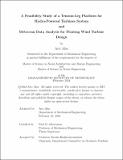A Feasibility Study of a Tension-Leg Platform for Hydro-Powered Turbines System and Metocean Data Analysis for Floating Wind Turbine Design
Author(s)
Alus, Avri
DownloadThesis PDF (7.398Mb)
Advisor
Sclavounos, Paul D.
Terms of use
Metadata
Show full item recordAbstract
Marine and wind energy stand as promising frontiers for clean and sustainable power generation. The first chapter of this study explores the feasibility of implementing a Tension Leg Platform (TLP) for a hydropower turbine system with an overall rated power of 1500 kW.
The TLP semi-submersible concept for harnessing ocean energy is an innovative approach, which allows the employment of turbines in deep waters near the water surface. The TLP's structural and tendon parameters are examined through simplified static and dynamic analyses, ensuring its stability under extreme conditions. Furthermore, a power yield analysis is demonstrated, utilizing hindcast datasets of the Gulf Stream, to meticulously pinpoint the most suitable site. This selection process takes into careful consideration factors such as current velocities, water depth, and proximity to the shoreline.
In the second chapter, we embark on a thorough preliminary analysis of metocean data, focusing on a potential site for wind turbine deployment. This analysis relies heavily on statistical examination, employing historical buoy data as well as high-resolution hindcasts for rigorous data validation. The findings illuminate the frequent occurrence of adverse weather conditions, marked by the prevalence of high and severe conditions, intermittently punctuated by storms.
Date issued
2024-02Department
Massachusetts Institute of Technology. Department of Mechanical EngineeringPublisher
Massachusetts Institute of Technology